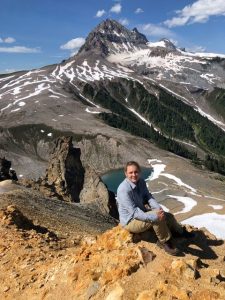
Soren Huber is a MSc student in the Botany department, supervised by Patrick Martone. Her current research involves phylogenetic and morphometric analysis of coralline algae. Some of her side projects have included assisting with intertidal macroalgal biodiversity surveys, Martone lab collections, and sea urchin feeding trials.
As a young adult, Soren was torn between majoring in biology and majoring in music. Music took a temporary early lead when she, as an undergraduate at the University of Maryland (College Park) followed an amazing opportunity to major in trumpet performance. Post graduation, she worked as a buyer of organic produce to supplement her musician’s income, but soon biology reemerged as her dominant interest. She began taking chemistry and biology courses on the side, and after visiting the Pacific Northwest, she realized that the organisms and ecosystems she most wanted to study were found on the West Coast. So, she packed her car, drove across the continent, settled in Washington State, and fulfilled her graduate school research prerequisites at Friday Harbor Laboratories, where she fell in love with seaweeds, particularly the corallines.
At UBC, Soren has been a teaching assistant; twice for Biol 230 (Fundamentals of Ecology), once for Biol 320 (Survey of Algae), and she is currently in her second term of assisting the Biol 209 lab (Diversity of Algae, Fungi, and Bryophytes).
What do you most enjoy about being a TA?
I get to do two things I love, teaching and field work, at the same time. I enjoy going into the field and the laboratory, studying some of my favorite organisms, and demonstrating how cool these things are. I also relish the challenge of presenting complex material in ways that are more accessible to students who are encountering it for the first time.
I enjoy witnessing the amazing transformation that occurs over a single term. Students may come in having never used a microscope before. They may at first begin mistaking air bubbles for cells, but leave as experts, knowing substantially more about a specific field than the majority of the population.
I find that picture guides are extremely helpful, and they are fun to create.
What opportunities relating to teaching and learning have you been a part of?
I have enjoyed and really benefited from the training, ideas, and discussions from BioTAP sessions, and I completed the series. I was really excited to be asked to help out with facilitating sessions this year as a senior TA.
Otherwise, my “pedagogy” has informally come from trial and error, remembering what it’s like to be a student learning similar material for the first time, or from observations of my own instructors – Using their examples to figure out what seemed to work best, or what didn’t seem to be as effective.
I use myself as a Guinea pig. I’ve observed that if some aspect or content is not clear to me, it’s not clear to the students either. I’ve learned to foresee most of their questions and seek out answers prior to lab. Picturing myself in their shoes, I try to present the material in a way that anticipates any pitfalls so issues are addressed head on, and caught sooner rather than later on an exam, or never.
What do you like to do in your spare time?
Every chance I get, I go backpacking or camping. I don’t care as much for peak bagging, I guess they all sort of look the same to me. Rather, I’m in it for the lakes and streams, monumental trees, alpine flowers, moss, fungi, algae, and even the fun of getting wet wood to burn so that I can cook over an open fire (where permitted).
What is a fun fact about you that people may not know?
I’m very invested in historical/folk music and dance. I travel around the world learning and competing in traditional Scandinavian dance, and then teach the dances I learn abroad to my local dance community. I also play recorder, kelp horn and am learning how to play the cow horn.
What are your plans following graduation?
Visit my family more often, teach, travel, continue my research, and learn how to dive in a dry suit.